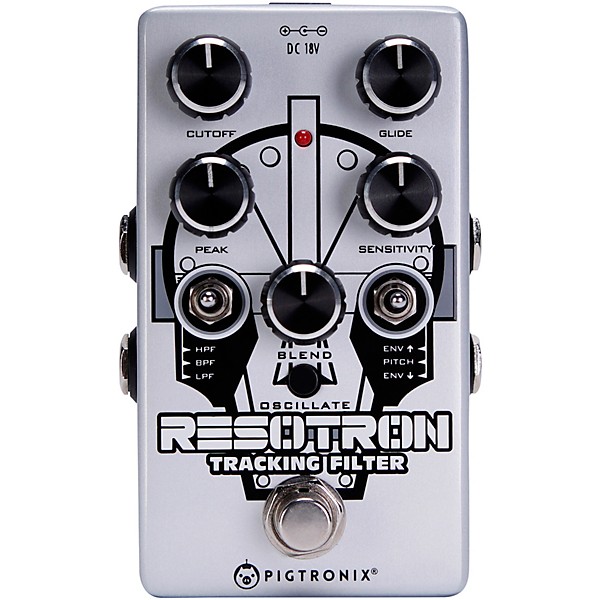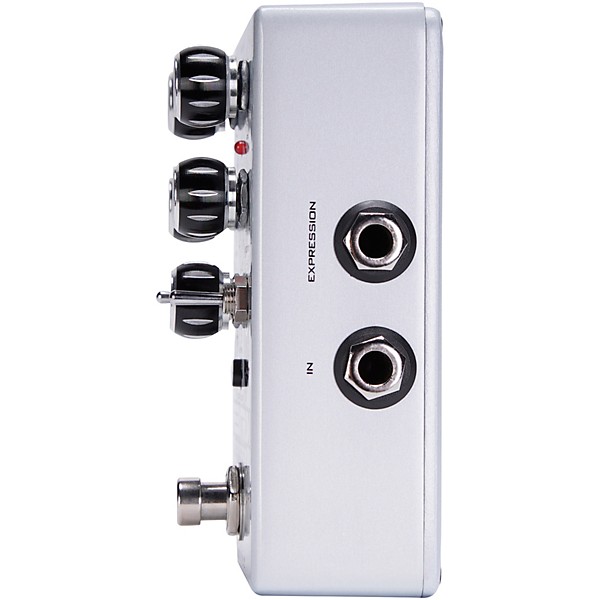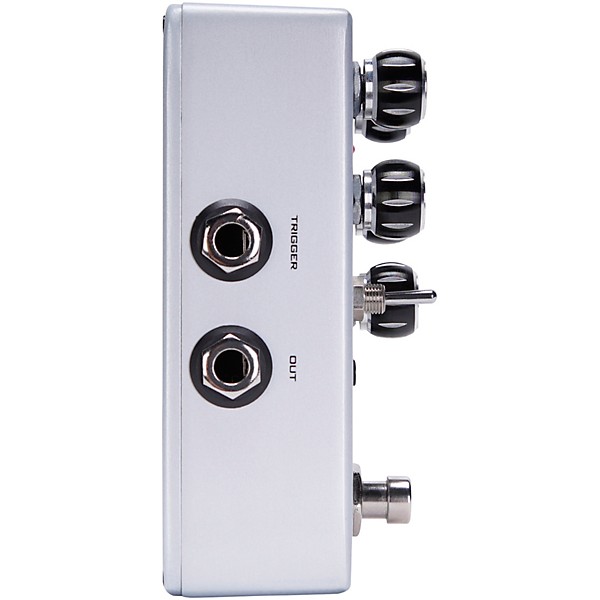- Popular Brands
Open Box
Open Box Pigtronix Resotron Filter Effects Pedal Level 1

Description
A push-button OSCILLATE function turns the Resotron into an analog synthesizer pedal. This mode shorts out the PEAK knob, effectively setting it to 100% while simultaneously activating a voltage-controlled amplifier (VCA) in the output stage. With the OSCILLATE function turned on, the CUTOFF knob sets the tuning of the synth effect while the VCA instantly follows the volume of your input signal. The synthesizer sounds created by the Resotron can also be radically altered by switching between the LPF, BPF and HPF modes, each of which has its own distinctive waveform and modulation characteristics when overdriven by the onboard compressor.
The multi-mode filter at the heart of the Resotron can be set to Low Pass (LPF), Band Pass (BPF) or High Pass (HPF) modes. Each of these voices has a distinctive character which can be manipulated by adjusting the PEAK knob to emphasize frequencies below, at or above the position of the CUTOFF knob. As the PEAK is increased, the resonance or “Q” of the filter becomes more extreme, up to the point of self-oscillation. A SENSITIVY control sets how dramatically the pedal will respond to playing dynamics in the UP and DOWN envelope modes, while a GLIDE control allows you to set how long it takes for the filter to move between notes in the PITCH mode.
Before the signal from the input of the pedal hits the filter inside the Resotron, it passes through an optical compression stage derived from the Philosopher’s Tone pedal. The increased volume and punch from the compressor can then be mixed into the audio signal using the BLEND control without affecting the SENSITIVITY of the envelope. Resotron accepts active CV and passive TRS expression pedal inputs for foot-controlled filter sweeps and outboard modulation which is mixed in parallel with the onboard pitch-following and amplitude tracking systems. The Resotron also features a TRIGGER (aka Sidechain) input which enables the musician to use an external audio source to modulate the filter.
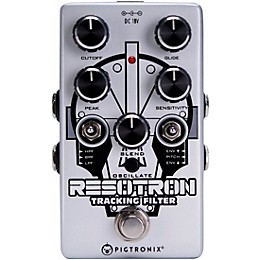
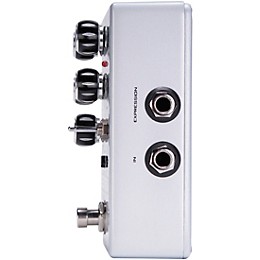
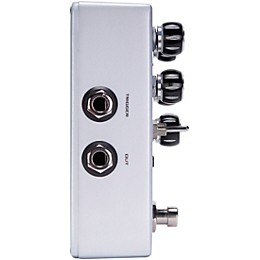
Specs
- 24dB/Oct Filter based on the SSM2040 chip
- Low-Pass, Band-Pass & High-Pass Filter options
- Velocity controlled UP & DOWN envelope modes
- Pitch Following envelope function with variable GLIDE
- BLEND control mixes in Philosopher’s Tone compression
- Expression pedal/0-5V CV input modulates CUTOFF
- OSCILLATE mode for monophonic synth sounds
- Sidechain TRIGGER input for external audio
- Hardwired true-bypass switching
- 18VDC power supply included
- 100% analog design
- Circuit design by Nick Cote
- Sound design by David Koltai
Featured Articles
Reviews
4.05
21 Reviews
67%
of respondents would recommend this to a friend
Most Liked Positive Review
My new favorite filter pedal
It sounds great, you can use it as a more traditional envelope filter (think q-tron ish) but also as a full on synth engine. It tracks super quickly, the cutoff adjustment allows you to tune the frequency with the oscillator turned on. Honestly tons of fun. It's 18v though so make sure you plan for that if you're trying to use it with a power supply you already own. Good news is it comes with its own adapter. Build quality is acceptable, fit and finish maybe not as great as other $200+ boutique pedals. Overall though, it is seriously cool.
Most Liked Negative Review
Nope
This pedal simply isn't very useful. It's OK as a standard envelope filter but not great. As for a wackier noise pedal it's very lacking. Not 'musical' at all. The whole oscillator setting is a mess, and it goes haywire far too easily. I watched a demo vid with the founder of the company playing it and he couldn't even get decent sounds out of it. Supposedly it's based on an old analog keyboard synth. Maybe it's an accurate recreation of that, but it's not well-suited for guitar. Bottom line: there's a reason these things are so heavily discounted. I kept it for a week, finally gave up and returned it.
- Performances12
- Home Studio10
- Professional Recording8
- Amateur Recording3
- Outdoor Events / Games2
- Difficult To Use5
- Limited Selection Of Effects3
- Poor Sound Quality3
- Not Responsive2
- Limited range of envelope1
- Experienced10
- Professional Musician9
- Novice2
- Excellent Sound Quality12
- Good Selection Of Effects11
- Responsive11
- Compact10
- Versatile8
Reviewed by 21 customers
Nope
submitted3 years ago
byB
fromSan Francisco
This pedal simply isn't very useful. It's OK as a standard envelope filter but not great. As for a wackier noise pedal it's very lacking. Not 'musical' at all. The whole oscillator setting is a mess, and it goes haywire far too easily. I watched a demo vid with the founder of the company playing it and he couldn't even get decent sounds out of it. Supposedly it's based on an old analog keyboard synth. Maybe it's an accurate recreation of that, but it's not well-suited for guitar. Bottom line: there's a reason these things are so heavily discounted. I kept it for a week, finally gave up and returned it.
Horrible!!!
submitted4 years ago
byBrian
fromTucson AZ
Sounded so bad I think it might have been defective. I returned it for a full refund.
Built like a tank and has lots of sonic potential
submitted4 years ago
byJim
fromScranto, PA area
I bought this for studio use and I think it will do fine there. The construction is solid and the tonal options are good with multiple filters, LP, HP and BP. My only gripe is that Pigtronix should have included a brief users guide, which was a striking omission especially considering how well packaged it was. You can get the guide online, and will need it to fully understand the pedal ...not every knob functions depending on the mode you select. Other than that, it's a solid pedal.
My new favorite filter pedal
submitted4 years ago
byLuke
fromRochester, NY
It sounds great, you can use it as a more traditional envelope filter (think q-tron ish) but also as a full on synth engine. It tracks super quickly, the cutoff adjustment allows you to tune the frequency with the oscillator turned on. Honestly tons of fun. It's 18v though so make sure you plan for that if you're trying to use it with a power supply you already own. Good news is it comes with its own adapter. Build quality is acceptable, fit and finish maybe not as great as other $200+ boutique pedals. Overall though, it is seriously cool.
adding new textures with this pedal
submitted4 years ago
byKim
fromSan Francisco CA
interesting filter effects, using on a new album project
Doesn't work very well in my bass rig
submitted4 years ago
byStuart
fromCharlottesville, VA
I think this would be much better on guitar or synth. It sounds pretty rad on the very upper end of the bass, but down low, definitely below the 10th fret F on the G string on a bass guitar, it doesn't respond very well. It is a really interesting pedal though, it produces a number of unique sounds, including some ring mod like sounds.
Q&A
Have a question about this product? Our expert Gear Advisers have the answers.
No results but…
You can be the first to ask a new question.
It may be Answered within 48 hours.


